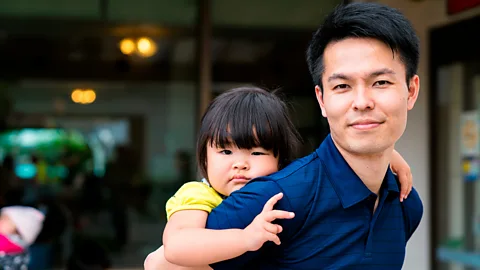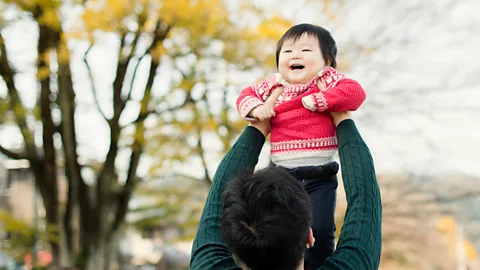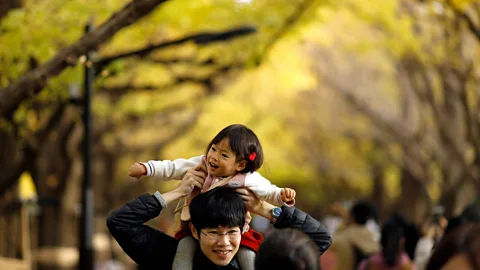Ikumen: How Japan’s ‘hunky dads’ are changing parenting
 Getty Images
Getty ImagesA government programme has tried to make fatherhood cool and sexy. Has it succeeded?
Cast your eyes over a Japanese newspaper, fashion magazine or manga story and you may find a new kind of ‘superhero’.
They are smiling and handsome as they play swordfight over breakfast or take a bike ride together in the park. The father and child may even be dressed in stylish matching outfits. They are sympathetic and understanding, and they will happily do the cooking and housework.
These are the ikumen: a combination of the word ikuji (childcare) and ikemen (hunk) – a stark contrast to the older stereotypes of the remote, workaholic father. The term was first devised by an ad salesman in the 2000s, and in 2010 the Minister of Health, Labour and Welfare launched the national Ikumen Project to promulgate the idea as a way of encouraging greater paternal involvement in family life.
The idea soon caught on, and today ikumen can be seen throughout Japanese popular culture. But does this trend really represent significant progress in gender equality? Or do the glossy photoshoots simply add a sparkle and sheen to a superficial change in attitudes, while women still shoulder most of the family responsibilities?
If you enjoyed this, you may also like:
In years gone by, the Japanese father’s primary role was considered to be that of the bread winner. These ‘salarymen’ were devoted to their company, working long hours to climb the corporate ladder and provide financial security to the family. “Utter commitment to one’s work represented the apotheosis of manliness”, writes Hannah Vassallo, who recently published an anthropological study of Japanese fathers for a book, Cool Japanese Men.
 Getty Images
Getty ImagesJapan, of course, was not alone in these views. But even in the 1980s the average man spent fewer than 40 minutes interacting with their children on the average workday – and that was often during a family meal. According to one observational study, some men could not even make tea or locate their own clothes without their wife’s assistance. When the father did interact with his children, he was often remote and commanded respect, even fear – a fact reflected in the common saying “jishin, kaminari, kaji, oyaji” – “earthquake, thunder, fire and father”.
Needless to say, these attitudes had some serious repercussions. They made it much harder for women to maintain a career after childbirth, for instance, leading many to become increasingly disenchanted with the concept of marriage. The result was that they started marrying later, or not at all – contributing to the now infamous dip in Japan’s birth rate. The 1980s also saw a rise in child suicides, which some linked to the lack of paternal support.
Even so, change was slow. In 2002, for instance, just 0.33% of eligible men took the paternity leave after the birth of a child. One survey, from 2008, reported that a third of men would have preferred to spend more time with their children – but they worried that their bosses would disapprove of the time taken off work.
 Getty Images
Getty ImagesThe government’s Ikumen Project was meant to remedy this situation, generating “a societal movement whereby men are able to become proactively involved in childcare”. It provided symposia and workshops, and fathers were also given the ‘Work-life Balance Handbook’ to help them juggle the competing demands of the office and the home.
Unlike previous campaigns to increase paternal engagement, the Ikumen Project painted the father as a heroic figure, emphasising his masculinity and sexual allure; one of its posters depicted one man tearing off his suit and shirt, Superman-like, to reveal the project’s logo on a t-shirt underneath, with the slogan “Ikumen strength for society”. The implication was that these ‘heroes’ were not just protecting their family; by nurturing the next generation of workers, they were helping to save the country.
Thanks to its connotations with the ikemen hunks, the term was generally well received. “Everyone in Japan would be familiar with the word ikemen,” says Vassallo. “And I think that’s how ikumen was born and gained any traction – it sounds a lot better than the previous words for a caring father that existed in Japanese before that point.”
Japan's untold stories
Welcome to BBC Future Now's Japan season, in which we explore the country's most exciting medical, technological, environmental and social trends.
You can discover:
 EPA
EPAYou can now find magazines like FQ (Father’s Quarterly) Japan advertising father-child matching outfits and family photoshoots alongside its celebrity interviews; it even held a Mr Ikumen pageant. Emotionally sensitive ikumen are the romantic leads in TV comedies and there is even a manga series – Ikumen! – that explores the trials and tribulations of 21-year-old Midorikawa Hiroya, a househusband raising his daughter while his wife works.
In a stark contrast to the old-fashioned salaryman, Hiroya’s sense of fulfilment and self-worth stems from his relationship with his daughter – and his ikumen status helps protect him from the typical stigma attached to unemployed men. In some strips, the women near to Hiroya and his friends blush with desire as they see the ikumen fathers playing with their children.
As a marketing campaign, the Ikumen Project has therefore been a great success, sparking some important discussions about the ways that fathers are portrayed. “The awareness is there,” says Vassallo. Yet it has also received its fair share of criticism. Many women, for example, feel resentful that men are being treated as heroes for taking a fair share of very routine jobs. So although they may repeat the phrase “ikumen over ikemen” – and express admiration for the caring fathers they encounter – they also wonder why their own efforts aren’t being recognised to the same degree.
 Getty Images
Getty Images“I think everyone jumped on the bandwagon at first,” Vassallo says. “and then [some people], especially Japanese women, thought 'let’s slow down a bit and see how much we should be holding these fathers up on a pedestal here.'” After all, some men may claim to be ikumen despite doing a tiny portion of the household chores. Even the official Ikumen Project Handbook – for all its good intentions – still presented the mother as taking the primary responsibility for the children; for the men, childcare is still a bonus.
Some men, meanwhile, have complained about “ikumen illness” - the exhaustion of meeting high expectations at work and at home – and even if they personally hold a more progressive view, there is still the fear that a devoted father who takes time out of the office may be penalised by antiquated bosses who don’t understand the new policies.
Nor should the Ikumen Project mask the many broader structural issues that can hold back gender equality. Brigitte Steger from Cambridge University, for instance, points out that Japanese law still doesn’t recognise the equal standing of each parent in cases of divorce. She says that many fathers are not obliged to pay alimony, and, conversely, they are not guaranteed to get access to their children “even when they had a good relationship with them”. Overall, Japan still remains very low on the Organisation of Economic Co-operation and Development’s rankings of gender equality in the workplace.
 Getty Images
Getty ImagesEven so, there are some signs that tangible positive changes are afoot. The take-up of paternal leave, while still low, has significantly increased since the Ikumen Project was first introduced, for instance – rising from 1.9% in 2012 to 7% in 2017. And fewer than 45% of people now support the idea that “men should work, women should stay at home” – a drop of 15% since 1992, when 60% supported the traditional gender norms.
And anecdotally, devoted fathers are now more visible in everyday life. “You see many fathers with their children, especially during weekends and in urban areas, and many fathers have quite warm relationships with their children,” says Steger, who edited the book Cool Japanese Men.
Vassallo agrees that real behavioural change is slow, but she has found that the fathers she interviewed were beginning to carve out their own, individual path. They may not meet the heroic image of the prototypical ikumen – and some even felt embarrassed to use the term – but they were taking pleasure in the upbringing of their children, sharing tips with other parents on Facebook and regularly attending PTA meetings. “It filled me with more of a sense that they are navigating a healthy relationship with their attitudes towards work and family,” she says. “That fills me with more optimism”
--
David Robson is a senior journalist at BBC Future. He is @d_a_robson on Twitter. Cool Japanese Men, edited by Brigitte Steger and Angelika Koch, was published by Lit Verlag in 2017.
If you liked this story, sign up for the weekly bbc.com features newsletter, called “If You Only Read 6 Things This Week”. A handpicked selection of stories from BBC Future, Culture, Capital, and Travel, delivered to your inbox every Friday.

